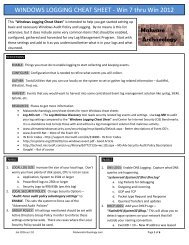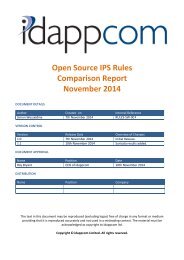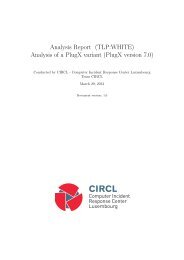The use of the Internet
The use of the Internet
The use of the Internet
You also want an ePaper? Increase the reach of your titles
YUMPU automatically turns print PDFs into web optimized ePapers that Google loves.
III. Policy and legislative frameworks III.<br />
A. Introduction<br />
72. In addition to using <strong>the</strong> <strong>Internet</strong> to plan and finance terrorist acts, terrorists also<br />
<strong>use</strong> it to recruit and train new members; communicate, research or reconnoitre potential<br />
targets; disseminate propaganda; and incite o<strong>the</strong>rs to carry out acts <strong>of</strong> terrorism.<br />
73. In <strong>the</strong> present chapter, issues related to <strong>the</strong> development <strong>of</strong> criminal justice policies<br />
and legislation aimed at countering <strong>the</strong>se threats are considered, with <strong>the</strong> aim <strong>of</strong><br />
identifying, by reference to examples and national experiences <strong>of</strong>fered by some States<br />
represented at <strong>the</strong> expert group meetings, common challenges and approaches that can<br />
ei<strong>the</strong>r impede or streng<strong>the</strong>n <strong>the</strong> effective investigation and prosecution <strong>of</strong> terrorism<br />
cases involving some aspect <strong>of</strong> <strong>Internet</strong> <strong>use</strong>.<br />
B. Policy<br />
74. In order to provide effective criminal justice responses to threats presented by<br />
terrorists using <strong>the</strong> <strong>Internet</strong>, States require clear national policies and legislative frameworks.<br />
Broadly speaking, such policies and laws will focus on:<br />
(a) Criminalization <strong>of</strong> unlawful acts carried out by terrorists over <strong>the</strong> <strong>Internet</strong> or<br />
related services;<br />
(b) Provision <strong>of</strong> investigative powers for law enforcement agencies engaged in<br />
terrorism-related investigations;<br />
(c) Regulation <strong>of</strong> <strong>Internet</strong>-related services (e.g. ISPs) and content control;<br />
(d) Facilitation <strong>of</strong> international cooperation;<br />
(e) Development <strong>of</strong> specialized judicial or evidential procedures;<br />
(f) Maintenance <strong>of</strong> international human rights standards.<br />
Policy approaches<br />
75. In its 2011 publication, Countering <strong>the</strong> Use <strong>of</strong> <strong>the</strong> <strong>Internet</strong> for Terrorist Purposes: Legal<br />
and Technical Aspects, 78 <strong>the</strong> Working Group on Countering <strong>the</strong> Use <strong>of</strong> <strong>Internet</strong> for<br />
78 See United Nations, Counter-Terrorism Implementation Task Force, Working Group on Countering <strong>the</strong> Use <strong>of</strong><br />
<strong>Internet</strong> for Terrorist Purposes, Countering <strong>the</strong> Use <strong>of</strong> <strong>the</strong> <strong>Internet</strong> for Terrorist Purposes: Legal and Technical Aspects (New York,<br />
2011).<br />
27







